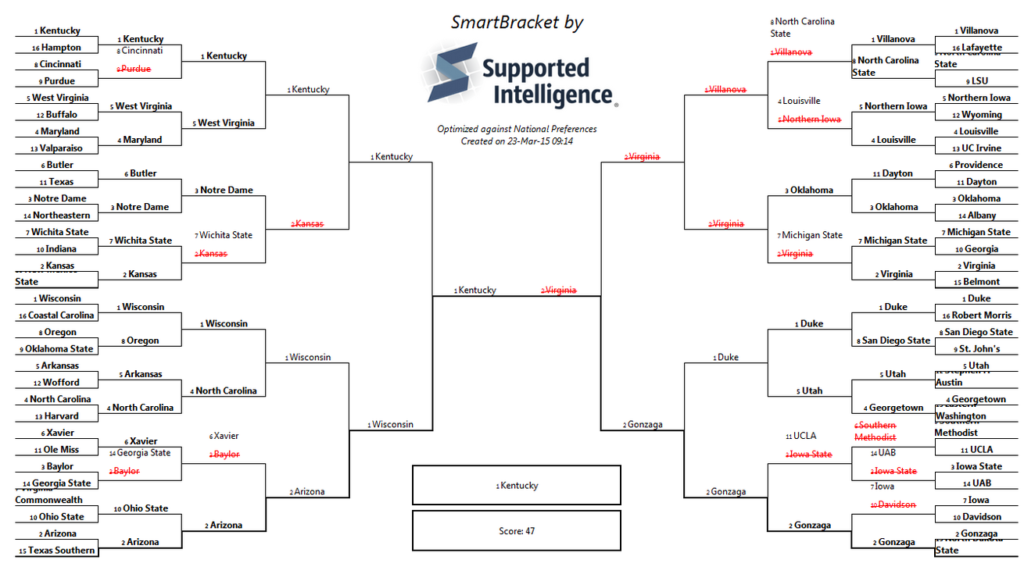Supported Intelligence helps your business make important decisions in complex domains. Using their patent-pending Rapid Recursive method, they allow users to compose, error-check, solve and report the results of sequential decision problems (complex decisions, where conditions evolve over time, based on random events). This method accounts for several random or unpredictable factors that can impact complex business decisions, such as inventory or portfolio optimization. In fact, the algorithm has effective application in many types of complex retail, finance, public policy, and economic problems.
And now, they have reached beyond the business world and applied their method to March Madness – helping you to answer “How should I pick my bracket, to beat my friends?”
While many approach their bracket with the mindset of predicting the results, no one has EVER accurately predicted all the winners and the odds are against anyone ever doing so. In fact, last year, William Buffett offered $1 Billion to anyone who picked the perfect March Madness bracket.
With this in mind, Supported Intelligence has used their software to take a different approach. Instead of picking the perfect bracket, the real problem they want to solve is what picks will maximize your chances of winning your pool. That means scoring more points than your office mates.
“You want to get the points that others don’t,” according to the Supported Intelligence team. The software does this by taking calculated risks. To do this, they combine tournament predictions, opponents’ picks and their Rapid Recursive Method to consider all possible tournament outcomes. They do this by breaking large and complex problems into a series of smaller problems, allowing them to evaluate nine-quintillion possible brackets in less than a second.
They find the ‘undervalued’ teams by assessing discrepancies between a team’s actual probability of winning relative to peoples’ perception of their winning.
For example, their model might suggest a team has a 60% chance of winning a game, but perception (as measured by how other people have picked their brackets) suggests that team only has a 40% chance of winning. That 20% spread is where the upset opportunity lies, according to their model.
After creating the algorithm, they ran 10,000 tournament simulations and figured out which underdogs might be most likely to win, statistically speaking. To test the algorithm, they then ran it against past tournaments and found that it consistently outperformed other methods.
This is the power of their method for your pool. They can help you pick which teams may not seem likely to win to outside observers, but actually are, statistically speaking.
When those teams win, you get a bigger payoff.
“SmartBracket is a demonstration of a powerful method developed here in East Lansing,” says the Supported Intelligence team, “that we are applying to business decisions.” To test your bracket against theirs, check out their website. Then you’ll know if you’re smarter than a computer. More importantly, you’ll know whether they can help you solve some of your own complex business problems.
Their bracket is available on their website. Think your bracket has it all figured out? Take a peek at the Smart Bracket and see if you’re smarter than a computer.



